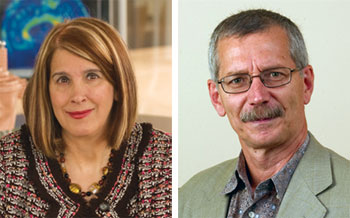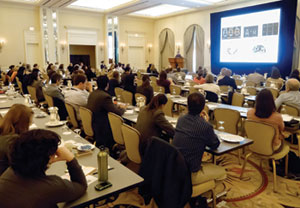Center for Vital Longevity

APS Fellows Denise Park and Michael Rugg are co-directors of the Center for Vital Longevity
The first of the United States’ 78 million baby boomers is turning 65 this year, at a rate of about one every 10 seconds. As life expectancy for older Americans increases, the impact of normal age-related cognitive decline, as well as the increased incidence of age-related neurological diseases, presents significant challenges that have economic consequences and compromise quality of life for many. For the U.S. to remain a vibrant, productive society, there is a need for our citizens to maintain cognitive health throughout life.
At the University of Texas at Dallas’s Center for Vital Longevity, a group of distinguished psychological scientists is focused on the scientific challenges associated with cognitive aging. Center researchers are both contributing to a basic understanding of cognitive aging and developing effective ways to slow or halt the cognitive decline that so often accompanies aging.
Armed with sophisticated brain-imaging technology and a breadth of training in psychological science and cognitive neuroscience, researchers at the center are among the leaders in neurocognitive aging research, working to solve one of the most pressing problems facing our society in the 21st century. They are part of a field of investigators at research centers worldwide who are at the forefront not only of delineating the structural changes in the brain that occur over a lifetime but also of deciphering how such changes affect specific cognitive abilities and behaviors. The evidence-based results from such studies ultimately could lead to new interventions to maintain mental vitality in a graying populace.
Founded in 2008, the Center for Vital Longevity is led by two APS Fellows, co-directors Denise Park and Michael Rugg. Individually, Park and Rugg bring to the center distinguished scientific careers and achievements. Together, they are building a dynamic research enterprise that is rapidly advancing the science of memory, cognition, and aging.
“We have the potential and the momentum to make the Center for Vital Longevity and the city of Dallas a nexus for research into the aging mind, and are poised to play a major role in developing ways to understand how to slow mental aging,” said Park, a former member of the APS Board of Directors.
Park and Rugg each have previously directed other university-based research centers devoted to cognitive neuroscience and aging. Park, the Center for Vital Longevity’s founding director and an internationally recognized expert on the aging mind, moved to Dallas in 2008 from the University in Illinois, where she was a professor of psychology and director of the Center for Healthy Minds. At the University of Texas at Dallas, she is a professor in the School of Behavioral and Brain Sciences, holds a Distinguished University Chair, and is a Regents’ Research Scholar.
In January 2011, Rugg joined the Center for Vital Longevity from the University of California, Irvine, where he was director of the Center for the Neurobiology of Learning and Memory. One of the world’s leading experts on human memory encoding and retrieval and the effects of age on memory, Rugg also is a professor in the School of Behavioral and Brain Sciences at UT Dallas and holds a Distinguished Chair in the school.
Joining the two directors in the Center for Vital Longevity is Cindy de Frias, an assistant professor of behavioral and brain sciences at UT Dallas whose research focuses on memory compensation in older adults as well as neurocognitive genetics and aging. Existing and planned projects in her laboratory include identifying genetic influences on individual differences in executive functions in middle-aged and older adults and designing an executive functions training program for cognitively impaired and healthy older adults.
An increasing number of postdoctoral fellows and graduate students also conduct research at the center. Center investigators — all have degrees in psychological science — oversee several research grants from the National Institutes of Health, including a MERIT Award to Park and two prestigious K-99 Pathway to Independence Awards to Center postdoctoral fellows Kristen Kennedy and Karen Rodrigue. The Center’s facilities include 30,000 square feet of research space. In addition, the investigators conduct functional and structural brain-imaging studies at facilities in the Advanced Imaging Research Center (AIRC), a collaborative enterprise between UT Dallas, UT Arlington, and UT Southwestern Medical School, where the AIRC is housed.
The scientists at the Center for Vital Longevity are engaged in a wide variety of studies. Some projects are basic-research oriented — aimed, for example, at gaining a better understanding of the patterns of neural activity associated with memory formation and retrieval. Other projects are to examine the factors that help define who will age well cognitively and who will not, while more clinically oriented studies are investigating interventions that might stave off age-related memory and cognitive decline.
Their findings to date have been significant, and ongoing projects are yielding new data on diverse topics — from how exercise affects memory and cognition to whether we can predict in middle age who might be most at risk for Alzheimer’s disease.
In 2006, for example, Park reported the first evidence that long-term immersion in a culture actually “sculpts” the brain and influences neural activity. In this research, conducted in the United States and Singapore with Michael Chee of Duke/National University of Singapore, Park and her colleagues discovered that young Western and Eastern brains process information differently. Western brains, they found, are geared more toward specific objects in a picture, while East Asian brains focus more on context and, as a result, process pictures as a whole. The team has discovered that there are differences in cortical thickness in the frontal cortex in young adults as a function of culture but with age, these cultural differences in brain structure are no longer apparent, suggesting the universality of neural aging. Park and Center scientist Chih-Mao Huang reviewed several recent studies on this topic, including their own research, in a 2010 article published in Perspectives on Psychological Science.
Park, along with Patricia Reuter-Lorenz of the University of Michigan, also proposed in a 2009 review paper that as we age the brain builds “neural scaffolds” to maintain an optimal level of function despite some decline in its physical structure. One of Park’s largest and most notable ongoing studies is the Synapse Project, which is systematically testing whether an engaged lifestyle — including exercise, acquiring new skills, and/or participating in social activity — can slow down the process of cognitive aging by facilitating the development of these supportive neural scaffolds. Data from this five-year study currently are being analyzed.
Rugg is investigating how neural activity in the brain gives rise to fundamental cognitive functions like memory, attention and language. In pursuit of this question he has helped pioneer two different investigative methods — event-related potentials, or ERPs, and functional magnetic resonance imaging, or fMRI. These techniques measure the brain activity of healthy individuals while they undertake experimental tasks designed to tap specific cognitive abilities.
Rugg has made major contributions to the understanding of how different types of memory map onto distinct brain networks and how these networks operate and interact when memories are being formed or retrieved. He is particularly interested in episodic memory, the type of memory that allows us to remember unique events that are tied to a particular place and time.
“Understanding how episodic memories are formed and retrieved in healthy subjects is important because this type of memory declines sharply with age and is severely affected in the earliest stages of Alzheimer’s,” Rugg said.
Over the past few years, he has contributed to the literature demonstrating that as people grow older, there is a tendency for their brains to become more active than the brains of younger people while acquiring and retrieving memories. Intriguingly, he has shown recently that memory is better in those people who show the least overactivity. A major focus of his current research is to understand why age-related overactivity in the brain occurs, whether it contributes to age-related decline in memory, and, if so, what can be done to lessen these deleterious effects.
Along with other members of her lab, Park also is undertaking an ambitious study, the Dallas Lifespan Brain Study, that shows great promise for predicting who might be at risk for Alzheimer’s, well before symptoms appear. New radiotracer substances that latch on to amyloid deposits allow researchers to see amyloid plaques in the living human brain. Amyloid buildup plays a critical role in the diagnosis of Alzheimer’s, but Park’s research on otherwise healthy middle-aged and older individuals is aimed at determining whether such deposits can predict who is most at risk for developing the disease later on in life.
Park said that in the coming year, the Center will grow significantly, both in personnel and in intellectual capital. Several new postdoctoral fellows will join the Park and Rugg laboratories, and new faculty members currently are being recruited from a pool of exceptionally talented early-career scientists.
“Our research is at an exciting stage,” Park said. “We’re learning more every day about the brain’s memory circuits, we have new data on interventions that might stave off cognitive decline, and we’re using brain-imaging technology to understand better the progression of Alzheimer’s disease. It truly is remarkable how far we’ve come in such a short time.”
Rugg said that the support from UT Dallas and from the local and scientific communities has been tremendous.
“As we expand our cadre of outstanding investigators, we expect the Center for Vital Longevity to continue to drive scientific discovery,” he said.

Dallas Aging and Cognition Conference
The Center for Vital Longevity hosts the annual Dallas Aging and Cognition Conference, which provides an important venue for cognitive aging scientists to present their latest findings. The 2011 conference was held in February, and presentations focused on understanding how the aging brain affects memory and other key cognitive functions. The two-day event featured 22 invited speakers and nearly 150 attendees. Speakers included the following APS Fellows: Roberto Cabeza, Duke University; Fergus I.M. Craik, Rotman Research Institute; David Madden, Duke; Timothy Salthouse, University of Virginia; and Daniel Schacter, Harvard University.





Comments
I am a longevity researcher and have deep interest in memory linked to longevity. Would you be inclined to read the work I have been doing ?
APS regularly opens certain online articles for discussion on our website. Effective February 2021, you must be a logged-in APS member to post comments. By posting a comment, you agree to our Community Guidelines and the display of your profile information, including your name and affiliation. Any opinions, findings, conclusions, or recommendations present in article comments are those of the writers and do not necessarily reflect the views of APS or the article’s author. For more information, please see our Community Guidelines.
Please login with your APS account to comment.